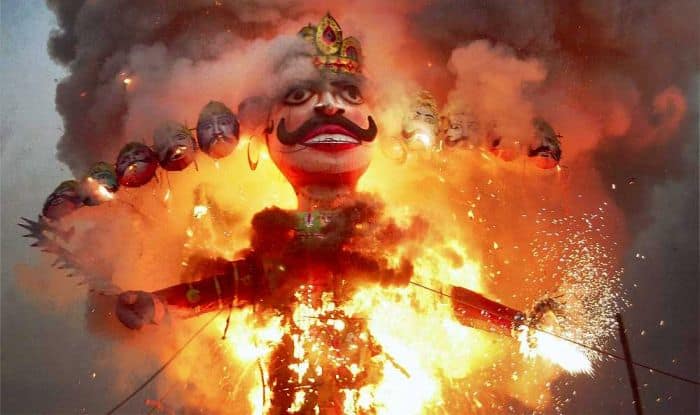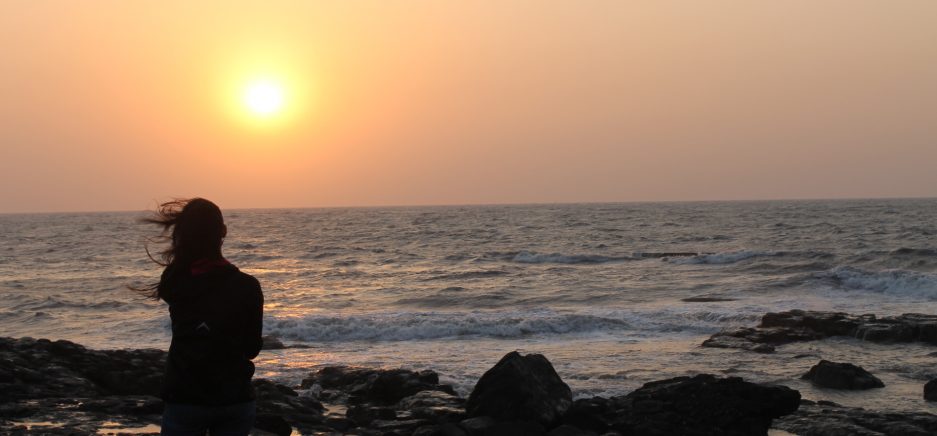
Recently in one of my writing group, someone brought the prompt “Having a conversation with Raavan”. In the beginning of the session, they talked about how bad they felt about burning of Ravana’s effigy, year after year, and how we shouldn’t be celebrating Dussehra in this fashion. We talked about the evil that recided within all of us. How we all have our dark side. So in the beginning I wrote about evil that resides within all of us. The shadow side of mine and how it looks from others’ eyes. But when it came to the Raavan prompt I couldn’t write it. No actually I did, it looked as dead on the page as dead it looked in my head. So in the end I read the evil inside me, piece. The session got over, but I was left with an unease, a feeling that you get when you don’t speak your truth, or unease that you get when you disagree with a bunch of people and are not able to put your point forth due to your incompatibility to speak objectively. Surely, it must have hit me in some ways, because here I am writing about it after two weeks. I have been pondering and wondering in my subconscious mind, how to bring my truth to the surface in the least objectionable manner for others. And here is my attempt to bring light to the things that have been disturbing me.
For me Ram and Raavan, both are the same person. They both reside in us, if you look closely you will find so many similarities between the two. Like Ram was a duty bound king, he did what he did because as Sita’s husband it was his duty to protect her. Similarly Raavan did what he did, to protect his sister, his sister’s honor was at stake. They both were duty bound, the difference is the sides or people they were supporting. Sita on one hand was living her life, and was kidnapped from her house because of something Ram did, technically laxman did on Ram’s order. Soopnakha did what she did following her heart, and she took it a bit far or maybe Ram took it too far by cutting her nose. Now as someone of this age, if we see a man lusting after a woman, we might send him to Jail, here the gender was reversed and there was no one legal system for all. They did what they deemed fit for that atrocious behavior. I think they went a little overboard with castrating her nose. But I don’t know what other options they have to push her away. Now, Ram was fighting for someone he loved and someone who was innocent. While Raavan was supporting someone he loved but someone who had done some wrong deed. Now looking at it objectively, how many people even in this day and age will forfeit their own blood, in order to be righteous. Will you abandon your son if he accidentally kills someone? Or will you leave your partner if they threatened your neighbor in a fit of anger, and that neighbor reported you to the police. Think about it !!
So Ravan and Ram both did what they did out of duty, but then who took it to extremes? I ask you that very question? Let me share a recent incident, where a 14 year old boy fell in love with a 20 year old girl, but the girl rejected the boy’s advances. The boy threw himself at the railway track and died. The boy’s family started harassing the girl and her family, until one day, they kidnapped the girl, raped her, and then shaved her head, blackened her face and made her walk in their vicinity. Now this my friends happened in this very century, just a week ago. Where someone avenged their dead by killing someone while being alive. Now if you look deeply at what Ravan did, he kidnapped Sita, knowing that in a society how the life of women can go ashtray, if she is Kidnapped by other men. Of Course there are flaws, Ram did her wrong and blah blah, I know that too, and yes I agree Ram should have stood by her. But in a way Ram lost even after winning the war. He lost his wife forever, the society took it away from him. But who brought it on him, Raavan did. Like what do you think will happen to this young girl, how long will it take her to recover from the trauma that she had suffered. Even if the boy’s whole family rot in jail, will it bring back what the girl has lost. So ask yourself, we are not questioning right and wrong, we are questioning the decision and from the place it came from, for each individual.
In this way Ram and Ravan are two sides of us, one who takes decisions from a place of objectivity even in times of crisis, while Ravan is the other side of us which in anger take decisions whose repercussions we don’t understand at that very moment. Don’t we all love people who are objective and think about repercussions of their actions. Isn’t this why Dhoni was the most loved captain of our National Cricket Team. We all strive to be there, at least I do, and if you start working on yourself, you will too. No it doesn’t make you immune or less empathetic but it teaches you to step back from your emotions, understand the situation and then act upon it. As the great spiritual saying goes, “In times of anger, be proactive instead of being reactive”. And by abiding by this very saying, you will just not save yourself but a lot of other people too. This brings me to my point, why burning Ravana’s effigy is important. It’s a reminder to burn the evil inside of us, and use those ashes to recreate a soaring phoenix out of it. We are not burning a person, we are burning the evil that is represented by a person.
PS: If you are a mythological music buff, look at the way these two prayers, one sung by Ram and other by Raavan, in praise of Lord Shiva, before the war. And if you understand music, you will understand what I am saying here, if my words didn’t say it.


Interesting, Interesting!
LikeLiked by 1 person
Thank you 😀
LikeLiked by 1 person